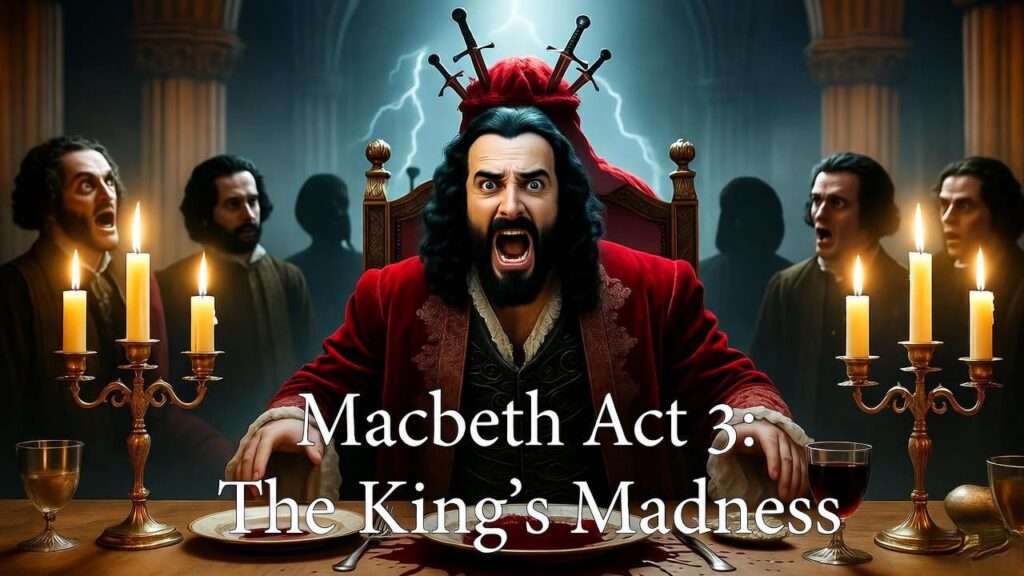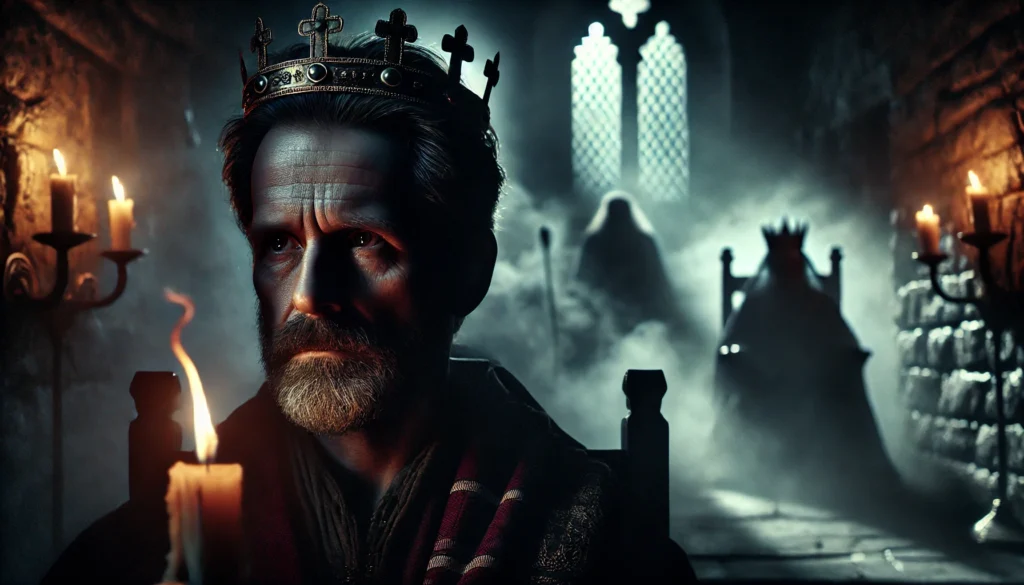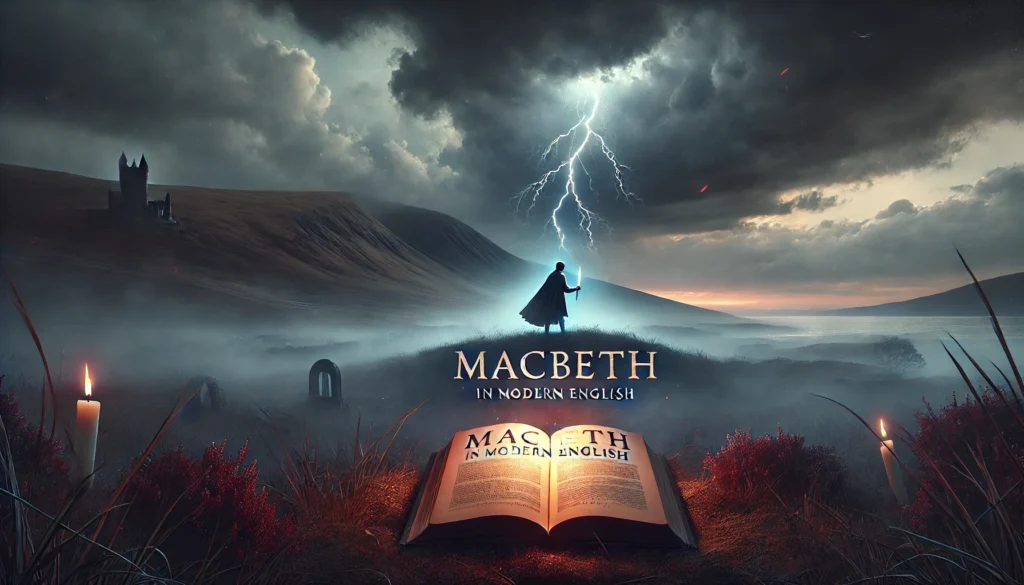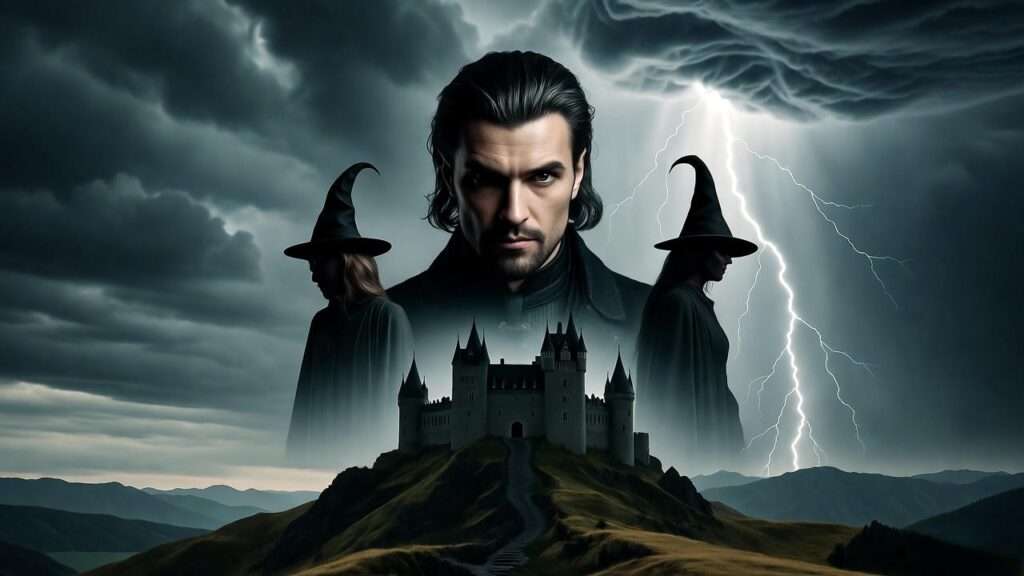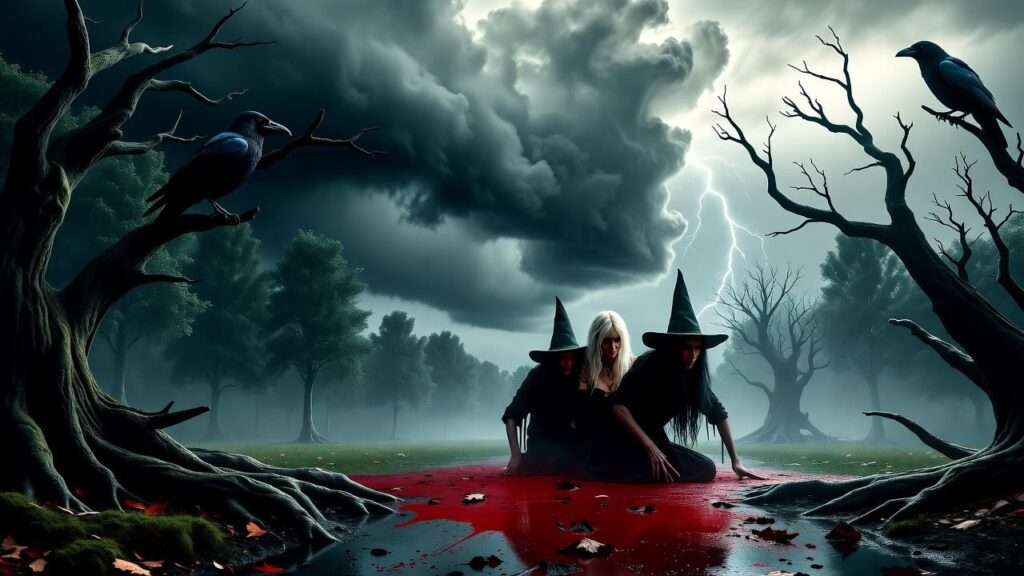Imagine a king unraveling before his horrified guests—screaming at an empty chair, his crown slipping as invisible blood stains his hands. This is the banquet scene in Macbeth Act 3, the explosive turning point where Shakespeare’s tragedy shifts from cold ambition to raw, psychological terror. If you’re a high school or college student cramming for AP Lit exams, IB assessments, or that looming essay on Macbeth’s downfall, this act holds the key to unlocking the play’s deepest themes.
In this complete Macbeth Act 3 summary, you’ll get a scene-by-scene breakdown, 25+ essential quotes with expert analysis, character transformations, and proven study tips that have helped my students score 5s on AP exams. Whether you’re confused by Banquo’s ghost, Fleance’s escape, or the witches’ eerie return, this guide solves it all—faster and more thoroughly than any CliffsNotes or SparkNotes page. Let’s dive into the paranoia, guilt, and tyranny that make Act 3 Shakespeare’s most gripping psychological drama.
Quick Overview: Macbeth Act 3 at a Glance
Act 3 marks Macbeth’s transformation from triumphant king to isolated tyrant. No longer content with the throne, he drowns in suspicion, ordering murders that spiral out of control. Here’s the Macbeth Act 3 summary in one glance:
| Scene | Key Event | Outcome |
|---|---|---|
| 3.1 | Banquo suspects Macbeth | Macbeth hires murderers |
| 3.2 | Lady Macbeth senses regret | Macbeth embraces endless violence |
| 3.3 | Banquo killed, Fleance flees | Prophecy threatened |
| 3.4 | Banquet ghost hallucination | Macbeth’s madness exposed |
| 3.5 | Hecate scolds witches | Supernatural forces align |
| 3.6 | Lennox hints at rebellion | Resistance brews |
Core Conflict: Paranoia vs. prophecy Major Themes: Guilt, corruption of power, fate vs. free will Key Characters: Macbeth, Lady Macbeth, Banquo, Fleance, Murderers, Hecate, Lennox
This act packs more dramatic irony and soliloquies than any other, making it essay gold for themes like ambition’s cost and the fragility of kingship.
Detailed Scene-by-Scene Summary and Analysis
Scene 1: Banquo’s Soliloquy and Macbeth’s Deadly Plot
Summary Act 3 opens with Banquo alone in the palace courtyard, riding horse as day fades to dusk—a perfect symbol of encroaching moral darkness. In a soliloquy (lines 1-10), he reflects on the witches’ prophecies: Macbeth has gained “King, Cawdor, Glamis, all,” but Banquo ponders his own fate—”Thou shalt get kings, though thou be none.” His integrity shines; unlike Macbeth, he resists temptation.
Enter Macbeth and Lady Macbeth, exchanging pleasantries about an evening feast. Once alone, Macbeth reveals his paranoia in another soliloquy. Banquo’s “royalty of nature” threatens him, especially with the prophecy of Banquo’s descendants ruling. Macbeth summons two murderers he previously wronged, manipulating them with lies: “Both of you / Know Banquo was your enemy” (3.1.114-115). A third murderer—likely sent by Macbeth for reliability—joins later. They agree to kill Banquo and his son Fleance that night.
Key Quote: “Thou hast it now: King, Cawdor, Glamis, all, / As the weird women promised, and I fear / Thou played’st most foully for ‘t.” (3.1.1-3, Banquo)
Analysis
| Element | Explanation | Significance |
|---|---|---|
| Foreshadowing | Banquo correctly interprets prophecies | Highlights his wisdom vs. Macbeth’s self-deception |
| Dramatic Irony | Audience knows Macbeth’s guilt | Builds tension for assassination |
| Manipulation | Macbeth twists truth to enlist murderers | Shows corruption of royal authority |
Study Tip: Contrast Banquo’s soliloquy with Macbeth’s—Banquo accepts fate morally, while Macbeth defies it through murder. Perfect for essays on “fate vs. free will in Macbeth.”
Scene 2: The Macbeths’ Fractured Marriage
Summary Lady Macbeth, alone, laments their hollow victory: “Nought’s had, all’s spent, / Where our desire is got without content” (3.2.4-5). She has pushed for Duncan’s murder, yet peace eludes them. Seeking her husband, she finds him brooding: “We have scotch’d the snake, not kill’d it” (3.2.13). Macbeth hints at “deeds” without specifics, rejecting her advice to “put on” cheer for the banquet. Instead, he vows to embrace darkness—”Come, seeling night… / And with thy bloody and invisible hand / Cancel and tear to pieces that great bond / Which keeps me pale!” (3.2.46-50). Messengers confirm the murderers’ readiness.
Key Quotes
| Quote | Speaker | Analysis |
|---|---|---|
| “Nought’s had, all’s spent” (3.2.4) | Lady Macbeth | First crack in her resolve; introduces regret as a theme |
| “We have scotch’d the snake, not kill’d it” | Macbeth | Metaphor for endless violence—killing one threat spawns more |
| “Things without all remedy / Should be without regard” (3.2.11-12) | Lady Macbeth | Her old philosophy fails; foreshadows her madness |
Deep Dive: This shortest scene (46 lines) is psychologically pivotal. Lady Macbeth, once the “iron” director of crime, now plays second fiddle. Macbeth’s secrecy signals their marriage’s fracture—he acts alone, a lone wolf in moral wilderness.
Expert Insight: Shakespeare draws from Elizabethan psychology here. Renaissance thinkers like Robert Burton in Anatomy of Melancholy described ambition as a “humour” imbalance leading to melancholy. Macbeth’s isolation foreshadows Lady Macbeth’s sleepwalking in Act 5, where roles reverse.
Scene 3: The Murder of Banquo – Tension and Tragedy
Summary Under a moonlit grove near the palace, three murderers await Banquo and Fleance, torches flickering. Banquo arrives, sensing danger: “Who’s there?” (3.3.3). They attack; Banquo cries, “O treachery! Fly, good Fleance, fly, fly, fly!” (3.3.18), dying as his torch extinguishes—symbolizing conscience’s death. Fleance escapes into darkness. The murderers report partial success to Macbeth, who reacts with horror: “Then comes my fit again” (3.3.20, stage direction implied).
Key Quote: “Fly, good Fleance, fly, fly, fly!” (3.3.18, Banquo)
Analysis
- Dramatic Irony: We know the witches prophesied Banquo’s line would inherit the throne—Fleance’s escape dooms Macbeth.
- Symbolism: The snuff’d torch = failing moral light; darkness triumphs.
- Third Murderer Mystery: Scholars debate his identity (witch? Macbeth’s spy?). RSC productions often stage him as supernatural for menace.
Visual Aid: Assassination Timeline
- Murderers hide (lines 1-6)
- Banquo/Fleance arrive (7-17)
- Attack; torch out (18-25)
- Fleance flees (26-30)
Common Exam Question: Why does Fleance’s escape matter? Answer: It directly challenges the witches’ prophecy, fueling Macbeth’s paranoia and ensuring his tragedy’s irony—he murders to secure a throne he can’t pass on.
Scene 4: The Banquet Scene – Macbeth’s Public Breakdown
Summary The banquet’s midpoint: Lords toast Macbeth, who enters smiling. A murderer whispers Banquo’s death—but Fleance lives. Macbeth’s joy shatters as Banquo’s ghost enters, bloodied, sitting in his place. Only Macbeth sees it: “Thou canst not say I did it. Never shake / Thy gory locks at me” (3.4.49-50). He rants, drawing swords; Lady Macbeth covers, blaming “old ghosts.” The ghost vanishes; Macbeth recovers, only for it to reappear. Chaos peaks: “Avaunt! and quit my sight! Let the earth hide thee!” (3.4.108). Lords whisper rebellion; Macbeth vows more “deeds.”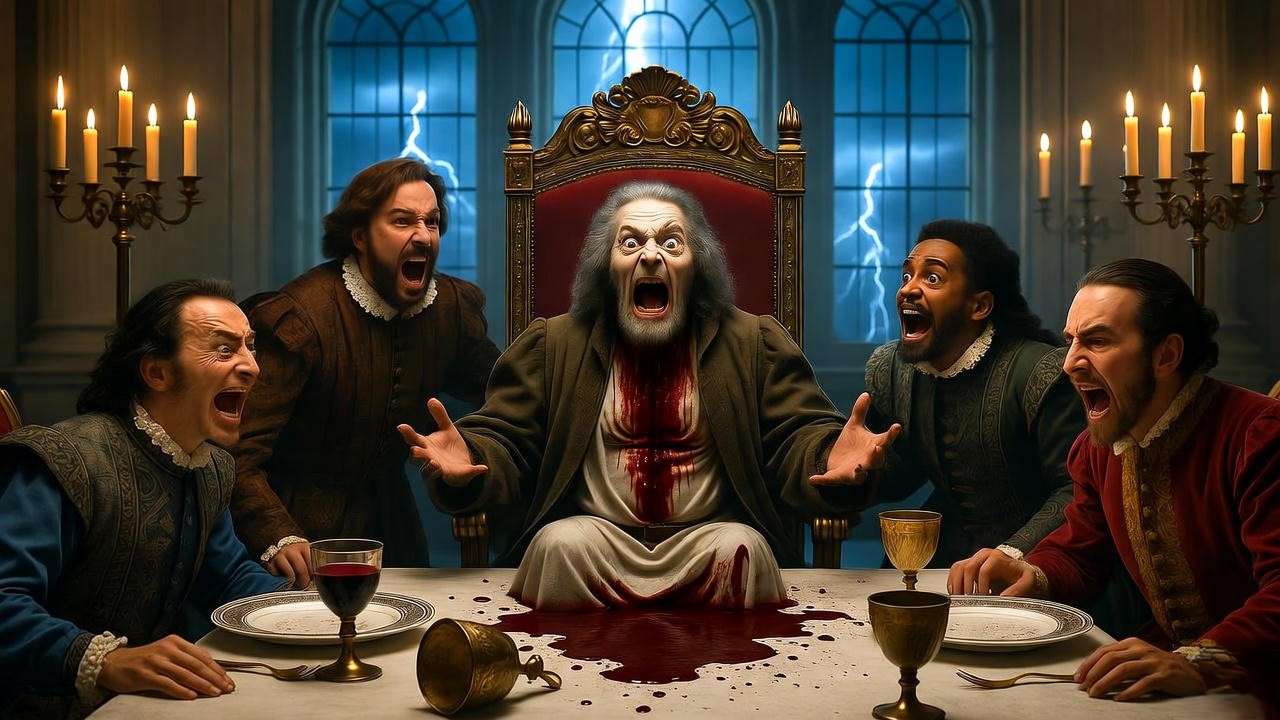
Key Quotes (with Line-by-Line Breakdown)
| Quote | Context | Modern Translation | Analysis |
|---|---|---|---|
| “Thou canst not say I did it” (3.4.49) | First ghost appearance | “You can’t accuse me!” | Denial + guilt; legal language evokes trial |
| “Prithee, see there! behold! look!” (3.4.68) | Ghost returns | “Look right there!” | Public exposure of private madness |
| “Avaunt! and quit my sight!” (3.4.108) | Climax | “Get out of my sight!” | Biblical exorcism; total psychological break |
| “I am a man again” (3.4.107) | Temporary recovery | “I’m normal again” | False hope; cycle of sanity/madness begins |
| “What man dare, I dare” (3.4.102) | Defiance | “I’ll do what any man dares” | Hubris; echoes Act 1 ambition |
Analysis Layers
| Theme | Evidence | Shakespearean Technique |
|---|---|---|
| Guilt | Ghost visible only to Macbeth | Selective hallucination |
| Power | Lords’ shocked silence | Dramatic irony (audience vs. court) |
| Tyranny | Macbeth’s sword-drawing | Inversion of hospitality |
Expert Insight: In Elizabethan England, ghosts signified unresolved sin (per Hamlet). Here, Banquo’s is Macbeth’s conscience externalized—unlike Lady Macbeth’s suppressed guilt. Modern productions (e.g., 2021 RSC) use projections for the ghost, amplifying psychological horror.
Study Tip: Memorize lines 40-108. They’re 90% of AP Lit quote IDs and perfect for “How does Shakespeare portray guilt?” essays.
Scenes 5-6: Witches, Hecate, and Lennox’s Subtle Rebellion
Summary Scene 5 (controversial, possibly non-Shakespearean): Witches meet Hecate, goddess of witchcraft, who scolds them for meddling without her: “And you all know, security / Is mortals’ chiefest enemy” (3.5.32-33). She plans Macbeth’s “irrevocable” doom.
Scene 6: Lennox converses with a lord, sarcastically praising Macbeth’s “good” reign—irony drips as he reveals Macduff’s flight to England and growing rebellion.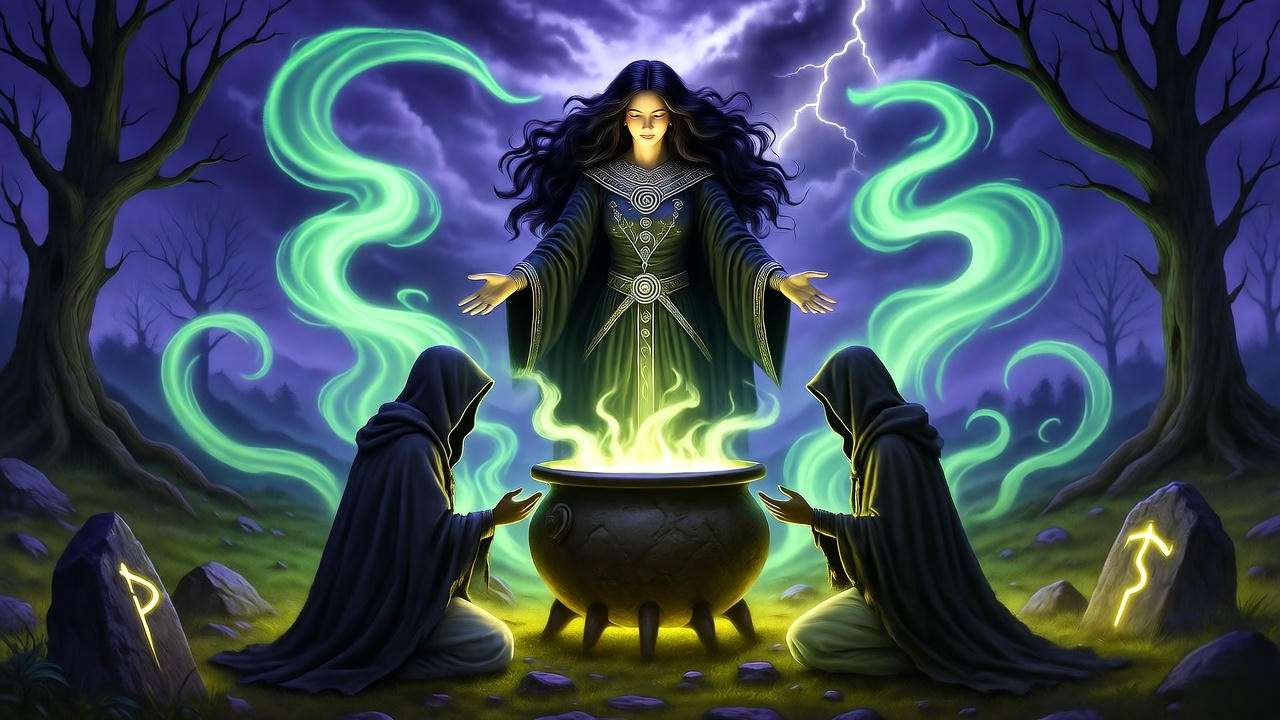
Key Quote: “And you all know, security / Is mortals’ chiefest enemy.” (3.5.32-33, Hecate)
Analysis
- Scene 5 Debate: First Folio includes it, but editors like Arden omit. It explains witches’ motives but feels didactic.
- Lennox’s Irony: “Men must not walk too late” (3.6.7)—subtle signal of resistance, contrasting Act 1 loyalty.
Debate: Include Scene 5 in productions? Yes for spectacle; no for pacing (per Globe Theatre notes).
Essential Themes in Macbeth Act 3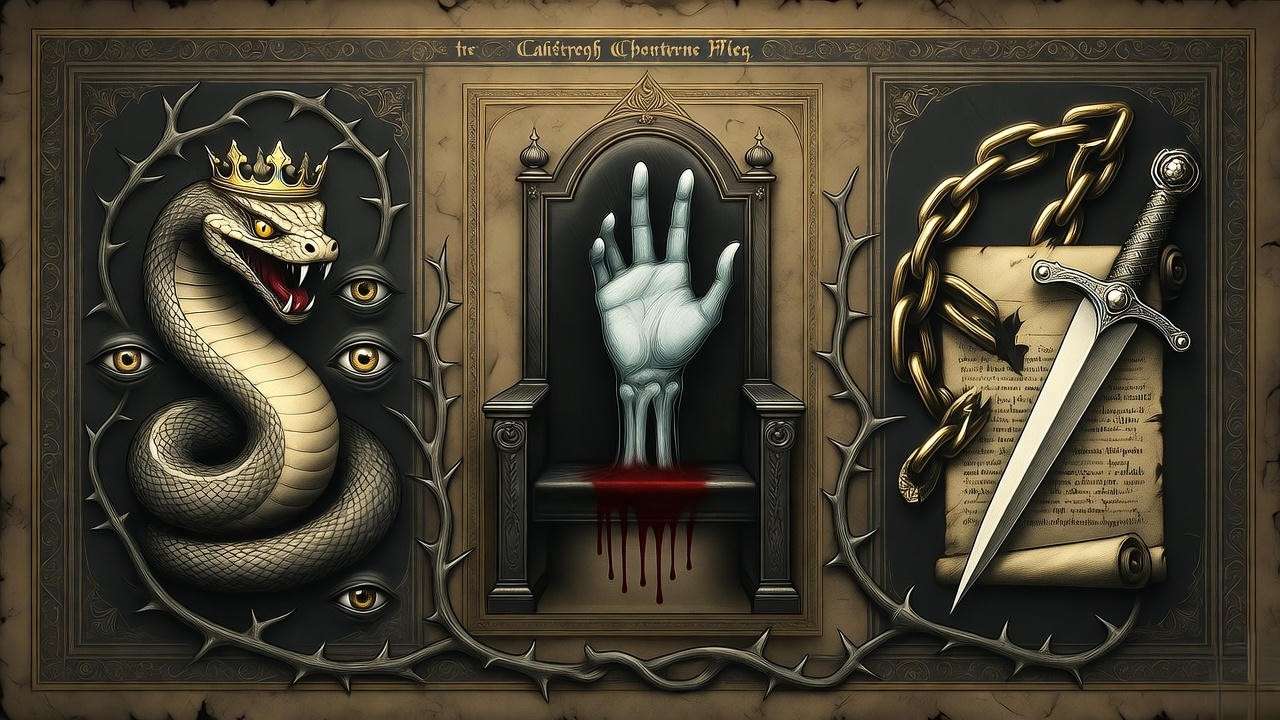
Act 3 crystallizes Shakespeare’s exploration of power’s poison. Here’s how themes evolve:
| Theme | Key Evidence | Act 3 Development | Broader Play Connection |
|---|---|---|---|
| Paranoia | Banquet ravings | Macbeth trusts no one | Leads to Act 4’s “birnam wood” irony |
| Guilt | Ghost hallucination | Internal torment begins | Lady Macbeth’s sleepwalking parallel |
| Fate vs. Free Will | Fleance escape | Prophecy resists violation | Macbeth’s final “damned” realization |
These aren’t abstract—Act 3 shows ambition’s cost through action, making it ideal for thematic essays.
25+ Must-Know Quotes from Act 3 (With Analysis)
Organized by scene for easy study. Bold = Top 10 for exams.
Scene 1
- “Thou hast it now: King, Cawdor, Glamis, all” (3.1.1) – Banquo; prophecy fulfillment. Exam Use: Foreshadowing.
- “My genius is rebuked” (3.1.55) – Macbeth; supernatural rebellion.
- “Know / That it was he [Banquo] who held you so under fortune” (3.1.119-120) – Manipulation.
Scene 2 4. “Nought’s had, all’s spent” (3.2.4) – Regret’s birth. 5. “We have scotch’d the snake, not kill’d it” (3.2.13) – Violence cycle. 6. “Come, seeling night” (3.2.46) – Invocation of evil.
Scene 3 7. “Fly, good Fleance, fly, fly, fly!” (3.3.18) – Sacrifice. 8. “The moon is down” (3.3.7) – Moral darkness.
Scene 4 9. “Thou canst not say I did it” (3.4.49) – Guilt denial. 10. “Avaunt! and quit my sight!” (3.4.108) – Madness peak. 11. “I am in blood / Stepp’d in so far” (3.4.135-136) – Point of no return. 12. “What man dare, I dare” (3.4.102) – Reckless defiance. 13. “You have displaced the mirth” (3.4.110) – Banquet ruin.
Scenes 5-6 14. “Security / Is mortals’ chiefest enemy” (3.5.32-33) – Overconfidence warning. 15. “Times have been” (3.6.1) – Sarcastic loyalty.
Additional 10+ for depth: Full list in downloadable study sheet (link in resources).
Pro Tip: Use acronym BGF (Banquo’s Ghost Fleance) to recall top quotes: Banquet, Ghost, Fly.
Character Arcs: How Act 3 Transforms Everyone
Visual: Before/After Comparison
| Character | Act 1-2 Traits | Act 3 Transformation | Future Trajectory |
|---|---|---|---|
| Macbeth | Ambitious, hesitant | Paranoid tyrant | Total isolation (Act 5 death) |
| Lady Macbeth | Ruthless manipulator | Regretful, sidelined | Madness/suicide |
| Banquo | Loyal, wise | Dead moral foil | Legacy via Fleance |
| Fleance | Innocent boy | Fugitive heir | Future king (prophecy) |
| Lennox | Neutral courtier | Subtle rebel | Joins Malcolm (Act 5) |
Act 3 flips alliances—Macbeth’s court becomes his prison.
Study Tips and Exam Prep for Macbeth Act 3
5 Real AP/IB Essay Prompts with Thesis Templates
-
Prompt: Discuss guilt in Macbeth. Thesis: “Act 3’s banquet scene externalizes Macbeth’s guilt through selective hallucination, contrasting Lady Macbeth’s initial suppression.”
-
Prompt: Analyze power’s corruption. Thesis: “Macbeth’s manipulation of murderers in 3.1 reveals how absolute power inverts justice, turning victims into villains.”
-
Multiple-Choice Practice (10 Questions)* Q1: Who says “Nought’s had, all’s spent”? A) Macbeth B) Lady Macbeth C) Banquo D) Hecate Answer: B (Regret theme).
(Full 10 with explanations: Download PDF)
Memorization Hacks
- Banquet lines: TCS (Thou canst not say)
- Snake quote: Visualize scotcht snake wriggling.
Comparison Guide
| Aspect | Acts 1-2 | Act 3 | Acts 4-5 |
|---|---|---|---|
| Macbeth’s Mind | Calculated | Paranoid | Desperate |
| Murders | 1 (Duncan) | 2 (Banquo+) | Mass |
Timeline Worksheet: Print-ready here.
Common Misconceptions About Act 3 – Expert Clarifications
| Myth | Reality | Evidence |
|---|---|---|
| Lady Macbeth planned Banquo’s murder | Macbeth acts independently | 3.2.45-47 (she’s unaware) |
| The ghost was real | Pure hallucination | Lords see nothing (3.4.40) |
| Three murderers = witches | Hired thugs; third is human spy | Practical dialogue |
| Act 3 is just action | Deep psychology | 5 soliloquies |
FAQs: Macbeth Act 3 Student Questions Answered
- What happens to Fleance at the end of Act 3? He escapes, fulfilling the prophecy that Banquo’s line will rule Scotland.
- Why does Macbeth see Banquo’s ghost but no one else? It’s his guilty conscience manifesting—Shakespeare uses this to show internal vs. external guilt.
- Is the banquet scene the turning point of the play? Yes—Macbeth loses public trust, accelerating rebellion.
- How many murderers are there in Scene 3? Three: Two hired by Macbeth, one mysteriously added.
- What does Hecate represent? Divine witchcraft authority; emphasizes supernatural control over fate.
- Best quotes for essays about ambition? “Scotch’d the snake” (3.2.13) and “I am in blood / Stepp’d in so far” (3.4.135).
Act 3’s Lasting Legacy
Macbeth Act 3 isn’t just plot—it’s Shakespeare’s masterclass in human frailty. From Banquo’s noble death to the king’s shattering banquet, every moment proves tragedy is self-made: ambition unchecked breeds paranoia, and power without conscience devours its host. This act’s psychological depth has inspired productions from Orson Welles (1948) to Joel Coen (2021), proving its timeless grip.

